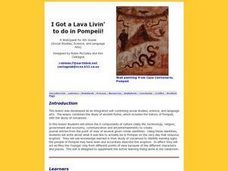Curated OER
The Ruins of Pompeii: A Window into History
Sixth graders research the history of Pompeii and its destruction. Locate important geographical features of Rome. Gain insight into the past through archaeological interpretation. Synthesize historical information through imaginative...
Curated OER
I Got a Lava Livin' to Do in Pompeii
Scholars imagine themselves as citizens of Pompeii in 79 AD. First they are assigned a job (or place in society like a child or slave). Then they record their daily activities for the weeks leading up to the eruption of Mt. Vesuvius in...
Curated OER
Magazine Mosaics
Almost every teacher has a stack of old magazines lying around. Get creative and turn them into mosaics! That's right, this resource explains how kids draw, design, cut, and paste to create mosaic art from recycled magazines. Connect...
Curated OER
Proper Nouns
Use this worksheet to help your class identify proper nouns. They circle the proper nouns in 16 sentences. Answer key is provided.
Curated OER
Neo-Classicism
Taking students from the origins of Neoclassical art, architecture, sculpture, painting, and decorative arts to the "sunset" of the artistic movement, this slideshow provides ample infomation and examples of the art form. The slides...
Curated OER
Pumpkin Seeds Mosaic
Pupils examine the history of mosaics. They follow instructions to create their own pumpkin seed mosaic. They also bake some of the seeds to enjoy as a treat.
Quia
Quia: Mt. Vesuvius and Pompeii
Go on a scavenger hunt to find information about Mt. Vesuvius and Pompeii. Find the answer to the provided questions using the links given on the site. Learn about volcanoes, Roman history, and the city of Pompeii.
United Nations
Unesco: Archaeological Areas of Pompei, Herculaneum and Torre Annunziata
This World Heritage website looks at the Roman towns of Pompeii and Herculaneum, and wall paintings at Torre Annunziata, that were buried when Mount Vesuvius erupted in 79 AD. Found here are a description, news, maps, documentation,...
Houghton Mifflin Harcourt
Harcourt: School Publishers: Unraveling Ancient Mysteries: Pompeii
Harcourt School reveals the background to the 79 C.E. eruption of Mt. Vesuvius and the destruction of the Roman city of Pompeii and nearby Herculaneum. Features include animations of the eruption, pictures, and information to explore.
Science Struck
Science Struck: Facts About Mount Vesuvius
Read about the geology and history of Mount Vesuvius in Italy, how it was formed, its destruction of Pompeii and Herculaneum in AD 79, the next eruption in 1944, and what it is like today.
Other
Roman Painting: Frescoes From Campania
Gives detailed descriptions, classifications, and pictures of the various wall frescoes found in the Naples area of Italy during the period of ancient Rome. This includes the city of Pompeii.
Curated OER
Educational Technology Clearinghouse: Maps Etc: Plan of Pompeii, a.d. 79
A map of Pompeii showing Gate of Herculaneum (A), Gate of Vesuvius (B), Gate of Capua (C), Gate of Nola (D), Gate of Sarno (E), Gate of Nocera (F), Gate of Sabiae(G), Gate of the Seashore (H), Forum (I), Temple of Jupiter (J), Basilica...
Forum Romanum
Outlines of Roman History: Flavian Emperors: Reign of Titus
William Morey offers a description of the brief reign of Titus in his textbook of 1901.
Curated OER
Educational Technology Clearinghouse: Clip Art Etc: Pompeii
Excavating a house at Pompeii from eruption of Vesuvius, which buried the cities of Herculaneum and Pompeii.-Colby, 1899
Other
History of Painting: Greek and Roman Painting
This resource, although focusing more on Greek painting, contains some insight information on ancient Roman painting, primarily the Roman frescoes.
Curated OER
Educational Technology Clearinghouse: Clip Art Etc: Candelabrum
Originally a candlestick, but afterwards the name of a stand for supporting lamps, in which signification most commonly occurs. The candelara of this kind were usually made to stand upon the ground, and were of a considerable height. The...
Curated OER
Educational Technology Clearinghouse: Maps Etc: Italy, 1904
A geo-political map of Italy showing country and region borders current to 1904, major cities, railroad lines, and navigable rivers. Physical features include mountain ranges with elevation measured in feet, major rivers and watersheds,...
Curated OER
Etc: Maps Etc: Italia Up to the Time of Augustus, 27 Bc
A map of Italy prior to the ascension of Augustus Caesar in 27 BC. The map shows the Roman territories of the peninsula south of the Alps and east of the River Varus (Var), and includes the islands of Corsica, Sardinia, and Sicily, the...
Curated OER
Unesco: El Salvador: Joya De Ceren Archaeological Site
Joya de Ceren was a pre-Hispanic farming community that, like Pompeii and Herculaneum in Italy, was buried under an eruption of the Laguna Caldera volcano c. AD 600. Because of the exceptional condition of the remains, they provide an...
Curated OER
Educational Technology Clearinghouse: Clip Art Etc: Atramentum
A term applicable to any black colouring substance, for whatever purpose it may be used, like the melan of the Greeks. There were, however, thress principal kinds of atramentum: one called librarium or scriptorium, writing-ink; another...
Curated OER
Educational Technology Clearinghouse: Clip Art Etc: Laterna
In later Greek, a lantern. Two bronze lanterns, constructed with nicety and skill, have been found in the ruins of Herculaneum and Pompeii. One of them is represented in the annexed woodcut. Its form is cylindrical. Within is a bronze...
Curated OER
Educational Technology Clearinghouse: Clip Art Etc: Skin Bottles
A Roman skin bottle from specimens at Pompeii and Herculaneum
Curated OER
Educational Technology Clearinghouse: Clip Art Etc: Skin Bottles
A Roman skin bottle from specimens at Pompeii and Herculaneum














